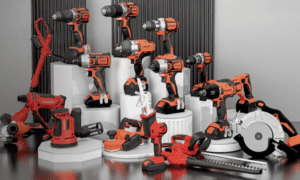Have you ever stopped to think about the incredible impact that industrial products have on our daily lives? From the moment we wake up in the morning until we go to bed at night, these powerful creations shape and enhance our everyday experiences. Whether it’s the technology in our smartphones, the machinery that brews our coffee, or even something as simple as a light bulb illuminating our homes, industrial products have truly revolutionized every aspect of modern existence.
Introduction to Industrial Products
Industrial products play a crucial role in shaping our everyday lives. From the clothes we wear to the cars we drive, these products are an integral part of our daily routines. But what exactly are industrial products? In this section, we will explore the definition of industrial products and their importance in various industries.
Industrial Products and Their Importance
Industrial products are goods that are produced for use in other industries or businesses rather than being sold directly to consumers. These products play a crucial role in our everyday lives by providing the necessary tools and materials for the production of goods and services. They can range from raw materials like steel and plastic to complex machinery like computers and turbines.
One of the main characteristics of industrial products is their durability. Unlike consumer goods, which are designed for personal use and have a shorter lifespan, industrial products are built to withstand heavy usage in different settings. This makes them an essential part of many industries, such as manufacturing, construction, transportation, and energy production.
These products also go through rigorous testing and quality control processes to ensure they meet industry standards before being used in production. As a result, they are known for their reliability and consistency in performance. This is crucial for businesses, as it ensures smooth operations without interruptions or delays due to faulty equipment.
Another defining feature of industrial products is their customization options. Manufacturers often offer tailored solutions according to the specific needs of their clients. This allows businesses to optimize their processes with specialized equipment that can increase efficiency and productivity.
The importance of industrial products cannot be overstated, as they form the backbone of many industries worldwide. For instance, without steel production plants or oil refineries, we would not have infrastructure like buildings or roads or access to vital resources like fuel for transportation.
The History of Industrial Products and Their Evolution
The history of industrial products dates back to the Industrial Revolution, which began in the 18th century. This was a period of significant technological advancements and social changes that led to the development of new manufacturing processes and machinery. The introduction of steam power and mechanization revolutionized the way goods were produced, leading to increased efficiency and mass production.
Prior to this era, most goods were handmade by skilled artisans and craftsmen. However, with the advent of industrialization, factories emerged as the primary source of manufacturing. This resulted in a shift from individual craftsmanship to large-scale production, where products could be made faster and at a lower cost.
One of the first industries to emerge during this time was the textile industry. With the invention of machines such as the spinning Jenny and power loom, textile production became more efficient than ever before. This led to an increase in demand for cotton, which fueled colonialism and drove global trade.
In addition to textiles, other industries also experienced significant growth during this period. Iron production saw major advancements with the introduction of new techniques such as puddling and rolling mills. This allowed for stronger and more durable iron products that could be used for construction purposes.
The transportation industry also underwent a major transformation with innovations like steam-powered locomotives, which revolutionized land travel. The invention of steamships further improved transportation by allowing for faster travel across oceans.
Types Industrial Products
Industrial products are essential to the functioning of our society, as they play a major role in shaping our everyday lives. These products can be classified into three main categories: consumer products, capital products, and intermediate products. Each type serves a specific purpose and has a significant impact on both individuals and businesses.
1. Consumer Products
Consumer products are goods that are purchased by individuals for their personal use or consumption. These include items such as clothing, food, electronics, and household appliances. While we may not realize it, almost everything we use on a daily basis falls under this category of industrial products.
One of the main characteristics of consumer products is that they have a short lifespan and require frequent replacement. This creates a constant demand for these goods in the market, making them an important part of the economy. The production and sale of consumer goods also drive employment opportunities and contribute significantly to economic growth.
2. Capital Products
Capital products are long-term investments made by businesses to increase their productivity or expand their operations. They include equipment, machinery, tools, vehicles, and buildings used in manufacturing processes or services provided by companies.
Unlike consumer products, which have a shorter lifespan, capital goods are expected to last for years or even decades before needing replacement. These industrial products not only aid in increasing efficiency but also enable businesses to produce larger quantities at lower costs.
3. Intermediate Products
Intermediate products refer to materials or components that are used in the production process of other goods rather than being sold directly to consumers. Examples include raw materials like steel or chemicals used in the manufacturing of finished goods such as cars or furniture.
These industrial products form an essential link between primary producers (e.g., farmers) and manufacturers, who transform them into final goods for consumers’ use. Without intermediate goods, many industries would struggle with sourcing the necessary inputs for their production processes.
Understanding the different types of industrial products is crucial to recognizing how they shape our everyday lives. From the food we eat to the cars we drive, these products play a significant role in meeting our needs and desires. Moreover, they contribute significantly to economic growth and provide employment opportunities for millions of people worldwide. Without industrial products, our society would not be able to function as efficiently as it does today.
Examples of Commonly Used Industrial Products
Industrial products play a crucial role in our daily lives, as they are essential for the production and functioning of various goods and services. From the cars we drive to the electronic devices we use, industrial products are responsible for making our lives easier and more efficient. In this section, we will explore some of the most commonly used industrial products in three major industries: automobiles, electronics, and machinery.
Automobiles:
The automotive industry is one of the largest users of industrial products. Cars, trucks, and other vehicles require a vast range of components that are manufactured by different industries using specialized machines. Some examples of commonly used industrial products in automobiles include engines, transmissions, bearings, brakes, tires, and electrical systems.
Engines: The engine is considered to be the heart of any vehicle; it converts fuel into mechanical energy to power the car. Industrial products such as pistons, cylinders, crankshafts, and camshafts are all vital components in an engine’s functioning.
Transmissions: Another critical component in a vehicle is its transmission system, which transfers power from the engine to the wheels. Industrial gears and shafts are used to make up this complex system.
Impact of Industrial Products on Our Daily Lives
Industrial products have become an integral part of our daily lives, influencing various aspects such as transportation, communication, and comfort. The impact of these products has been so immense that it is almost impossible to imagine a world without them.
One of the most significant impacts of industrial products on our daily lives is in the field of transportation. From cars and airplanes to trains and ships, industrial products have revolutionized the way we travel. These vehicles are powered by advanced engines and equipped with sophisticated technology that makes long-distance travel faster, safer, and more convenient than ever before.
Apart from personal transportation, industrial products also play a crucial role in public transportation systems. Buses, subways, and trams all rely on industrial products such as engines, brakes, and tires for their smooth functioning. These modes of transport have made commuting easier for millions of people worldwide.
Furthermore, the impact of industrial products extends beyond physical transportation to virtual communication as well. The advent of smartphones and other electronic devices has completely transformed how we communicate with each other. With just a few clicks or taps on our screens, we can now connect with anyone across the globe instantly.
This seamless communication is made possible by a wide range of industrial products, such as microchips, sensors, antennas, and networking equipment. These technological advancements have not only made communication faster but also more efficient and accessible to everyone.
Conclusion
It is clear that industrial products are an indispensable part of modern society, from large-scale machinery used in factories to smaller consumer goods found in households worldwide. Their enduring nature, coupled with continuous innovation, makes them essential tools for shaping our everyday lives, driving economic growth, and paving the way for a better future. We must recognize and appreciate the power of industrial products and their impact on our lives.



































